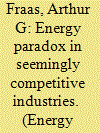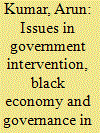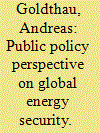|
|
|
Sort Order |
|
|
|
Items / Page
|
|
|
|
|
|
|
| Srl | Item |
| 1 |
ID:
096092


|
|
|
|
|
| Publication |
2010.
|
| Summary/Abstract |
This paper describes how management and information failures can retard transitions from the traditional use of biomass fuel by low income rural consumers and micro-producers.
In general, societies move away from traditional biomass use as economic development takes place. If one accepts the doctrine of revealed preference (built on the initial work of Samuelson, 1938), then these trends imply that such transitions provide net gains in utility. This paper shows how various "failures" entrench existing fuel use patterns-hindering the transition to new fuel use patterns.
In order to qualitatively discuss how these transitions may take place, an indicative neo-classical description of consumer and producer behavior is used. Three types fuel-transition "driver" are identified. The effect of information and management failures on these drivers, and thus the energy transition, is discussed.
Reference is made to a specific case study in which a partial transition from biomass occurred in response to an intervention to address an environmental management failure (the deforesting of a carbon sink.)
It is concluded that interventions to encourage transitions to cleaner sustainable fuel use may need to recognize and address management and information failures in a systematic manner.
|
|
|
|
|
|
|
|
|
|
|
|
|
|
|
|
| 2 |
ID:
166469


|
|
|
|
|
| Summary/Abstract |
Several federal agencies claim the existence of an energy paradox in competitive markets in their benefit-cost analyses: firms fail to use energy-saving equipment that on net would reduce their costs. Such findings appear incompatible with neoclassical views that private firms in competitive markets will seek to minimize costs. EPA and NHTSA (2016) justify their findings in part by claiming that owners of trailers pulled by others underinvest in energy-saving equipment because the trailer owners incur the costs of such investments while tractor owners get the benefits. We collected roadside data over three summers and model use of energy-saving equipment on trailers. We find associations consistent with cost-reducing behavior in the use of energy efficiency devices, such as skirts and automatic tire inflation devices, but no evidence that different ownership of tractors and trailers is associated with reduced use of energy-saving equipment on trailers. We recommend that EPA and NHTSA assess the in-use cost-effectiveness of such equipment and rigorously review the empirical basis for claims of market failures in competitive markets before claiming significant private economic gains in rulemakings.
|
|
|
|
|
|
|
|
|
|
|
|
|
|
|
|
| 3 |
ID:
115653


|
|
|
|
|
| Publication |
2012.
|
| Summary/Abstract |
Energy related Principal-Agent (PA) problems cause inefficient combinations of investment, operating costs, and usage behavior. The complex market structure of the trucking industry contributes to split incentives because entities responsible for investments in energy efficiency do not always pay fuel costs and drivers are often not rewarded for fuel-efficient operation. Some contractual relationships exist in the trucking industry that hinder responses to fuel price signals. Up to 91% of total trucking fuel consumption in the U.S. is affected by "usage" PA problems, where the driver does not pay fuel costs and lacks incentive for fuel saving operation. Approximately 23% of trailers are exposed to an "efficiency problem" when owners of rented trailers do not pay fuel costs and therefore have little incentive to invest in efficiency upgrades such as improved trailer aerodynamics and reduced tire rolling resistance. This study shows that PA problems have the potential to significantly increase fuel consumption through avoided investments, insufficient maintenance, and fuel-wasting practices. Further research into the causes and effects of PA problems can shape policies to promote better alignment of costs and benefits, leading to reduced fuel use and carbon emissions.
|
|
|
|
|
|
|
|
|
|
|
|
|
|
|
|
| 4 |
ID:
113570


|
|
|
| 5 |
ID:
119252


|
|
|
|
|
| Publication |
2013.
|
| Summary/Abstract |
The tendency for rising powers to seek control of resource markets is being repeated in Southern Africa, where rising powers led by China are competing for strategic minerals. This could lead to market failure, shutting out Western companies. However, competition does not mean that armed conflict will occur. The global reach of the United States is such that it can take measures short of war to guarantee the flow of minerals. China will be at a strategic disadvantage for some time in relation to the United States and cannot assert control over the flow of minerals. The Southern Africa case shows that even in the era of globalization, monopolization and nationalization of resources will still be attempted, but those efforts are likely to be countered by global forces in favour of free markets. Rising powers like China may temporarily monopolize resources found on their own territory, but strong global forces will ensure that the flow of most resources continues. Monopolization is unlikely to work outside the territory of rising powers, because they still must rely on sea lanes to transport those minerals. The United States still has the ultimate trump in its navy, which can stop the flow of resources to any would-be monopolist.
|
|
|
|
|
|
|
|
|
|
|
|
|
|
|
|
| 6 |
ID:
113744


|
|
|
|
|
| Publication |
2012.
|
| Summary/Abstract |
Despite an emerging literature on global energy governance, there so far is no extensive intellectual rationale for it. This article seeks to fill this gap by putting forward a public policy framework to analyze global energy. With that lens, energy security relates to problems of market failure at a transnational scale. These may occur due to imperfect competition; negative externalities; lack of information; or the presence of public goods. It is argued that major global energy risks such as oil price volatility, lack of transport infrastructure, and insufficient upstream investments can be convincingly conceptionalized as markets failing to provide for a crucial good-energy security. This article thus proposes market failure as an analytical justification of and as an intellectual foundation for further research in global energy governance, and sketches possible research agendas in that field.
|
|
|
|
|
|
|
|
|
|
|
|
|
|
|
|
| 7 |
ID:
137752


|
|
|
|
|
| Summary/Abstract |
Despite private investments exceeding two billion Euros and tax incentives of more than 500 million Euros, the market share of natural gas vehicles (NGVs) in Germany has lagged far behind expectations and behind market developments in other countries. With total cost of ownership being on average lower for NGVs than for gasoline and diesel vehicles this raises the question of the existence of market failure in the German NGV-market. We use a case study approach where we combine quantitative data with insights from a multi-industry expert panel and in-depth interviews with experts from industry, government and civil society in order to examine whether and how different types of market failure contribute to the status quo in the German market for NGVs. We conclude that coordination failure in complementary markets, an artificially created monopoly of service stations at motorways, imperfect information, bounded consumer rationality, and principle-agent-problems are the most prominent market failures inhibiting the development of a functioning market for NGVs. Our results are instructive for the design of effective public policies and investor strategies aiming to create markets for alternative fuel vehicles.
|
|
|
|
|
|
|
|
|
|
|
|
|
|
|
|
|
|
|
|
|